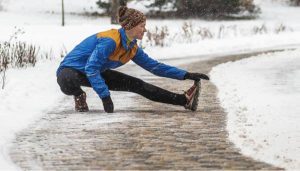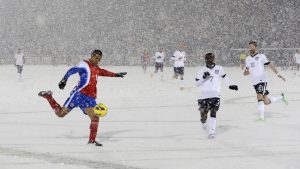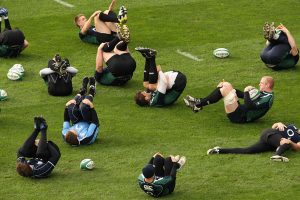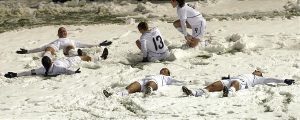What an appropriate time of year to remind us all of the essential role that an effective warm up plays in performance and injury prevention.
Performing an effective warm up program prior to playing sport reduces the risk of soft tissue injury and improves performance, in all conditions, not just cold weather!

Purpose and effect of warm up:
- Increase body temperature, heart rate and respiratory rate specific to the demands of the performance task
- Improve joint range of motion and muscle flexibility to the demands of the performance task
- Activate sport specific neuromuscular pathways to refine performance skills
- Activate sport specific mental alertness and concentration on the performance task
Warm ups may often appear varied, and can be delivered in a range of ways, but there are some common elements that should always be considered to ensure a safe and effective warm up.
Progressive
This applies to both intensity and skillfulness.
Warm up should start with low intensity activities and progress toward more sport specific, higher intensity movements and drills as body temperature and alertness increases.
This principle also applies to skills. The warm up should begin with simple, low skill movements and drills and progress toward more complex tasks and skillful movements.
Duration
The duration required for effective warm up is sport specific.
In general, sports and movements that demand high levels of intensity or skill or both, require longer warm ups.
For example, a sprint freestyle swimmer may spend an hour warming up for a 21-second performance but an iron-man triathlete may spend half an hour warming up for an 8-hour performance.
The athlete’s ability level, and level of competition also influences the warm up duration.
Well educated Coaches, Sports Physiotherapists and Exercise Physiologists can prescribe individually tailored warm ups that suit the sport and ability level of the athlete.
Sport Specific
Warm up should consist of sport specific actions, movements and drills as much as possible, but with controlled intensity and duration. This ensures that the correct muscle and nerve pathways are activated and ready to perform the task. Warm ups will often commence with more non-specific movements such as light jogging and progress to more sport-specific drills like small-sided games as athletes become more performance ready.
Other Tips for cold weather warm ups:
- Start warm up in extra clothing and remove as you warm up. Gloves and/or headwear are a good option to prevent heat loss
- Continue drinking small, regular sips of water before, during and after the warm up
- Be progressive, start slow and build your intensity as you warm up. Remember that warm up is not actual competition.
- You should be sweating by the end of your warm up
Coast Sport Physiotherapists and Exercise Physiologists are experts in prescribing safe, effective warm up programs, for both teams and individual athletes, designed to prevent injuries and improve performance. Book online, or call us on 02 43562588 to book your appointment today.







 Helping the Central Coast Feel Well, Move Well and Perform Well!
Helping the Central Coast Feel Well, Move Well and Perform Well!